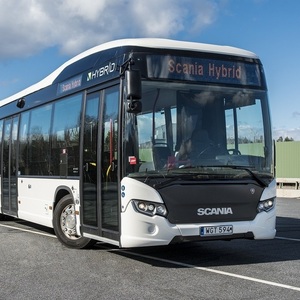Spain's capital city purchases 51 B100-compatible hybrid buses

Photo: Scania AB
May 12, 2016
BY Ron Kotrba
Scania announced that in June it will begin to deliver 51 hybridized Scania Citywide buses to Spain’s capital city of Madrid. The company says the buses are compatible with up to 100 percent biodiesel or renewable diesel.
The buses will be placed into service by seven operators on behalf of Consorcio Regional de Transportes de Madrid, which is responsible for the city’s public transportation.
“We are delighted that Madrid has recognized the advantages of Scania’s innovative hybrid technology and placed such a significant order,” said Klas Dahlberg, head of Scania’s buses and coaches.
Advertisement
Advertisement
According to Scania, Madrid is enforcing tough temporary measures to combat pollution, including requiring bus operators to transition toward greener technology. Conventional diesel has not been allowed in new buses since 2010.
“Many cities are cautiously examining the benefits of hybridization,” Dahlberg said, “but Madrid is now a leader in actually implementing alternative technology. These buses can help reduce CO2 emissions and make a substantial contribution to the agreed climate targets.”
The new Class II specification Scania Citywide, which feature cost savings and emissions-reducing hybrid technology meeting the EU suburban and short distance Class II regulations, can be operated at speeds of up to 100 kilometers per hour.
“This bus is ideally suited for combined city and suburban operations,” Dahlberg said. “That gives customers the opportunity to invest in carbon-saving operations with an estimated payback of just over five years, including battery replacements during the lifespan. By comparison, payback is some two years later in purely inner-city operations.”
Advertisement
Advertisement
The hybrid powertrain includes the Scania 9-liter engine and offers 320 horsepower with SCR-only technology, meaning selective catalytic reduction is used without a diesel particulate filter to meet stringent NOx and particulate matter regulations.
On the Citywide buses, the hybrid unit—an electric motor, generator and automatic clutch—is located between the engine and gearbox and is rated at 150 kW and 1,050 Nm.
A total of 1.2 kWh of energy storage is provided by a lithium-ion battery integrated in the roof structure at the front of the bus and is housed with a DC/DC voltage converter and a cooling unit. According to Scania, the use of its hybrid system together with a DC/DC converter, stop-start function and eco-roll provides significant fuel savings.
Related Stories
Broco Energy on July 17 announced a new partnership with the Massachusetts Port Authority (Massport) to deliver and transition Massport's fuel tanks to renewable diesel across its various facilities.
Shell Aviation, Accenture, and Amex GBT on July 10 announced Avelia is in the process of evolving to an industry solution with independent data hosting and a multi-supplier model helping users access the GHG benefits of SAF.
Avia Solutions Group, the world's largest ACMI (aircraft, crew, maintenance, and insurance) provider, has partnered with DHL Express to reduce greenhouse gas emissions from its international shipments using SAF.
Bangkok Airways Public Company Limited has officially announced the adoption of sustainable aviation fuel (SAF) on its commercial flights, reinforcing Thailand’s green aviation industry. The initiative took effect starting July 1, 2025.
Global digital shipbuilder Incat Crowther announced on June 11 the company has been commissioned by Los Angeles operator Catalina Express to design a new low-emission, renewable diesel-powered passenger ferry.
Upcoming Events










